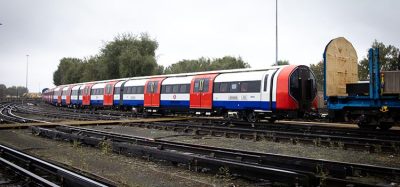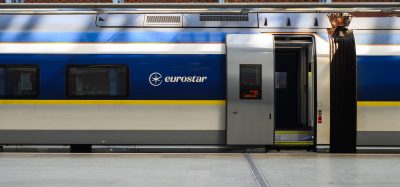‘Mobilising rail’ for the MaaS generation
Posted: 22 June 2018 | Mike Lambrou - CellPoint Mobile | No comments yet
Mike Lambrou, VP, Head of Sales, UK for CellPoint Mobile, discusses how a seamless journey must begin with passengers booking and paying for rail tickets directly from their mobile devices.


Now more than ever, with railways stretched to capacity during peak-time hours and passengers demanding a more connected experience, rail operators need a ‘mobile first’ approach to passenger transport. Ticketing and payments should be the first point of call regarding this transformation.
By making the transition from physical ticketing and payment systems to the mobile channel, rail service can be more convenient and efficient for passengers, less dependent on government subsidies and more profitable for owning groups and operators. Passenger smartphones can be the all-purpose channel (‘omnichannel’) for booking, ticketing, payments, up-selling, cross-selling, customer service and more – but, these opportunities will require foresight and scalable mobile investments.
The digital railway and the future of traveller experience
Digitalising railway infrastructure and digitalising customer experience are often treated separately, but together they could alleviate some common issues around capacity and traveller experience, whilst cutting costs and increasing revenue. In the years ahead, the rail sector could become more prone to friction as passenger demand grows and there is little innovation on the consumer side of sales and revenue – for example, not supporting popular alternative payment methods.
As the UK rail sector and others across Europe and the U.S. invest in digital signalling and other intelligent mobility solutions, they should be careful not to overlook the critical importance of passenger mobile devices for solving pre, present and post journey challenges. We discuss these challenges – and opportunities – at length in the 2019 UK Rail report1, including:
- How mobile solutions can increase existing capacity on the railway and smooth out peak-time demand
- Why rail operators need a more holistic approach to digitalisation that can be felt by the traveller
- How and why passengers are using their mobile devices for intermodal transport and Mobility-as-a-Service (MaaS).
Many train operating companies (TOCs) have historically outsourced their customers’ digital experience and as a consequence have not harvested the data and insight needed to make fully informed decisions on what their customers want. For comparison, consider what Uber and other ride-share companies are doing as they reveal new possibilities for intermodal transport through travel apps and data.
The rail sector in the age of Uber and MaaS
Uber is unique due to its great ability to cater to the mobile expectations and travel habits of smartphone users. Today’s travellers take for granted the fact that they can open an app, hire a private vehicle and experience a cashless, seamless, frictionless journey. Users can also track their Uber vehicle via GPS and receive real-time information (such as delays) – a feature that would be truly appreciated if integrated into rail travel. Uber is also able to monetise its mobile user base through ancillary services like Uber Eats.
If rail operators can leverage passenger smartphones to first improve the speed and convenience of frequent and recurring transactions, starting with mobile ticketing and payments, it will ultimately benefit other business areas. It will help increase ticket sales and cut ticket retailing costs at the station, while passengers with smartphones will be less dependent on station agents for information or transactions. Rail operators can partner with retailers and other travel suppliers to embed more ancillary revenue opportunities into the journey, similar to airline-airport-retailer partnerships. This is the kind of traveller experience that Uber clientele and other ‘digital natives’ want, and increasingly expect, from the railway.
With new technology on the passenger side to search, book and pay for rail tickets conveniently from a mobile device, operators can get more people to travel outside of peak periods through real-time discounts, rewards and other incentives. This would help to ease congestion, optimise existing rail capacity and make rail a world-class example of passenger transport in the age of MaaS.
Changing needs and expectations for the rail sector
Today’s changing work patterns represent both an opportunity and a threat to the rail industry. A study on flexible working undertaken by Timewise in 2017 revealed2 that almost nine out of 10 adult workers in the UK either currently work flexibly or aspire to do so and Millennials in work are increasingly deciding whether to travel at all, rather than how. Yet the cost of regulated fares, such as season tickets, have been increasing faster than the rate of wage inflation, indicating that the industry may not truly understand the price elasticity within the commuter sector.
With better solutions for mobile ticketing and payments, the rail sector could offer flexible ‘season ticket’ type products through the mobile channel, using a strategy of fare capping or price incentivising for off-peak travel. This sort of product is becoming increasingly relevant as the workforce becomes more mobile and people work from home or use flexible office space. There is also a social and environmental benefit to smoothing out peak demand – it helps ease the pressure that the ‘rush hour’ places on other transport infrastructure, such as the roads. This is a significant advantage of rail in comparison to Uber and other road-based MaaS companies.
Once rail operators address transportation-specific problems like overcrowding and off-peak demand, they can continue to build on their mobile investments with more proactive opportunities for revenue. They don’t have to become the ‘Uber’ of their respective industries, but they do need solutions that can manage the complexities (and opportunities) that are holding rail back from a truly ‘digital railway’ and create an open environment for MaaS.
Passenger transportation and the future of rail
With the growth of MaaS and other mobile-first approaches to passenger transport, more rail operators are interested in purchasing or upgrading systems for ticketing and payments. Approximately one third of UK rail income comes from passenger ticket sales: In a related industry, consider how airlines have successfully demonstrated (through fare unbundling) that there is significant opportunity for ancillary revenue on every transaction. But those opportunities increase tenfold through the mobile channel where rail operators can sell to passengers in more sophisticated ways, wherever and whenever.
One challenge for rail operators, particularly in a geographically large nation like the U.S. or in crowded markets like the EU, is getting public transport agencies across the region to consolidate the traveller experience around the mobile channel for greater ease, convenience and ultimately higher revenue. As technology providers, our mission is to ensure that passengers or riders are served according to their ticket and payment needs and preferences across transportation modes, whether they want to book on-the-go or pay with their preferred mobile wallet.
Meeting the needs of mobile-first and mobile-only passengers may seem like a tall order for rail operators, but not if they consider the flexibility and scalability of the mobile channel – it starts with simple solutions for mobile ticketing and payments and grows from there.
References
- https://www.cellpointmobile.com/about/resources/uk-rail-report-2019
- https://www.telegraph.co.uk/women/work/flexible-working-not-just-mothers-says-largest-ever-study-uk/
Biography
As VP, Head of Sales, UK for CellPoint Mobile, Mike Lambrou is overseeing the company’s strategic expansion into the UK passenger transportation sector, bringing sell-side and payment technology solutions to companies in the rail, ferry, bus, ride-share and associated industries. His deep expertise and industry experience – specifically in UK and European rail – help CellPoint Mobile develop solutions for the unique challenges faced by travel and transportation operators in the region.
Global Railway Review Autumn/ Winter Issue 2025
Welcome to 2025’s Autumn/ Winter issue of Global Railway Review!
The dynamism of our sector has never been more apparent, driven by technological leaps, evolving societal demands, and an urgent global imperative for sustainable solutions.
>>> Read the issue in full now! <<<
Related topics
Big Data, Digitalisation, Passenger Experience/Satisfaction, Real-Time Passenger Information (RTPI), Smart/Contactless Ticketing, Technology & Software







